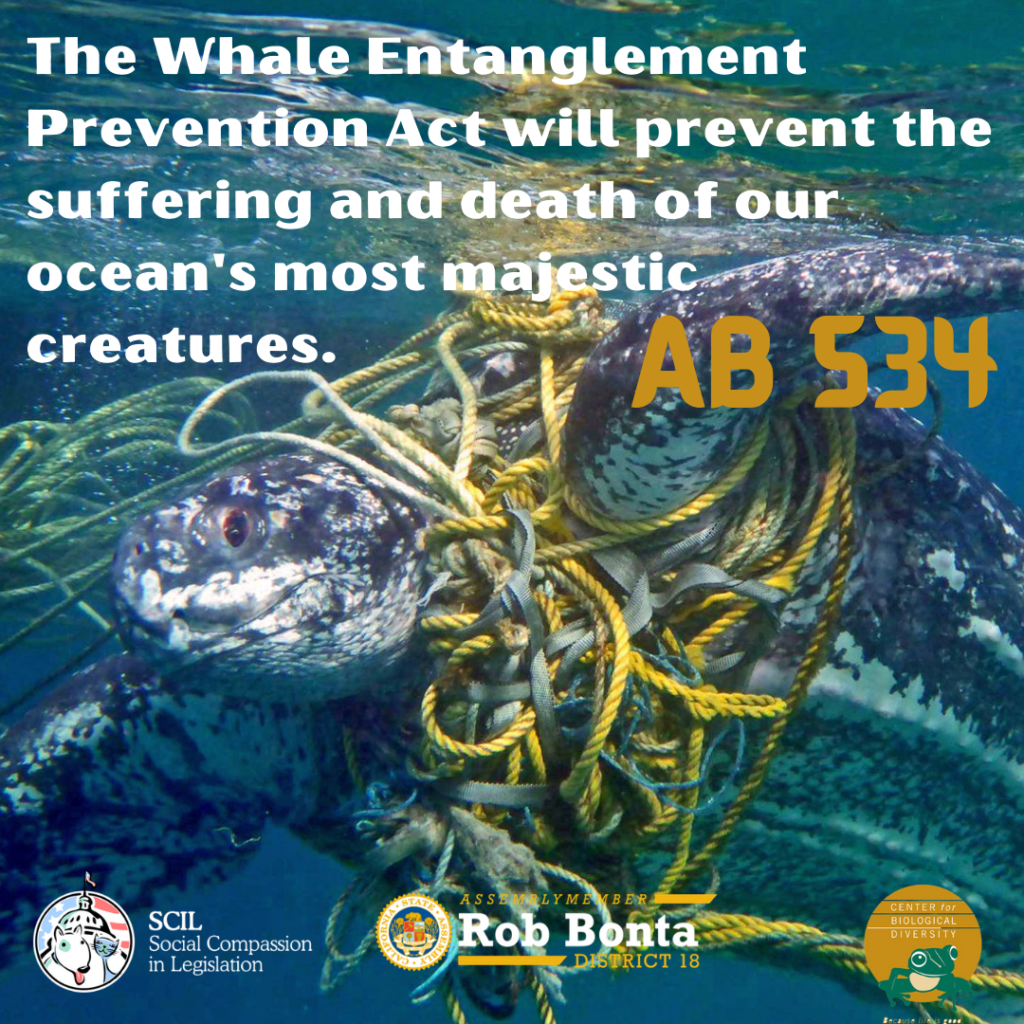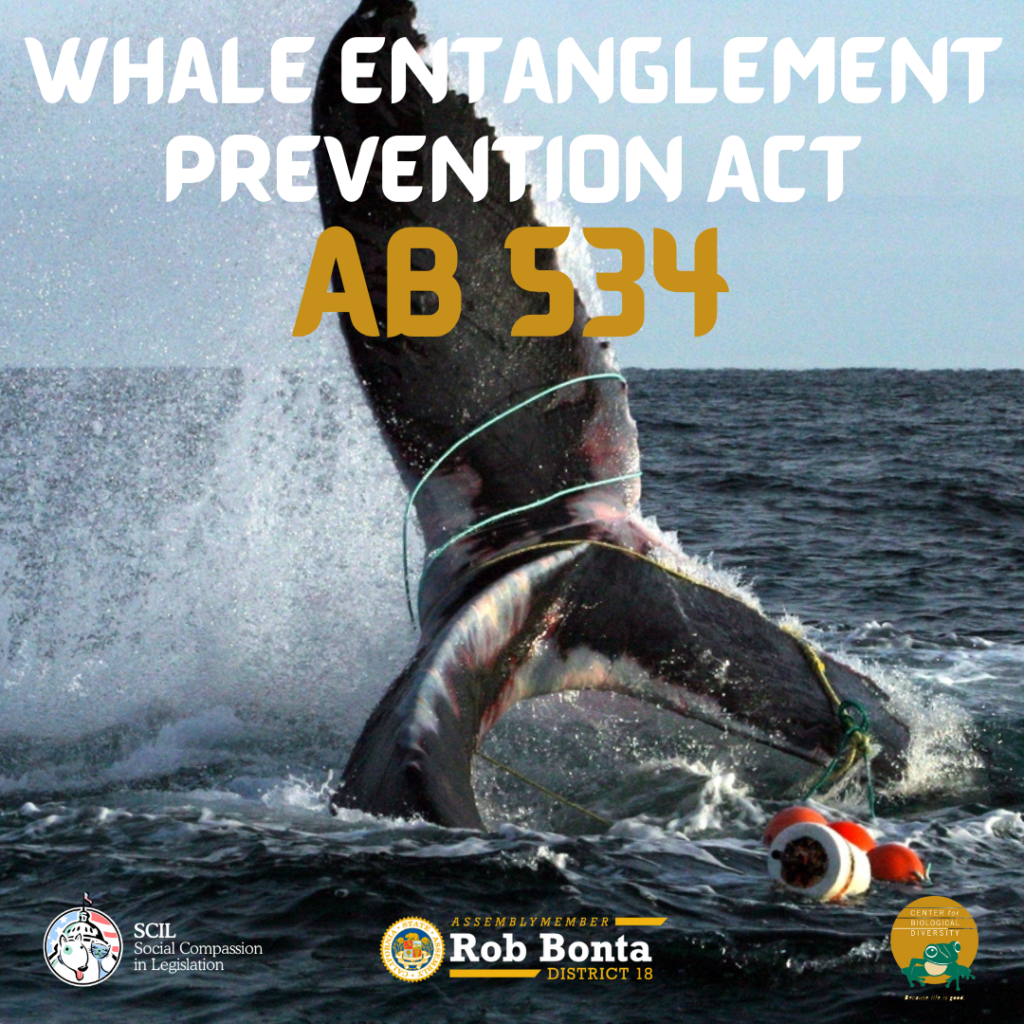

SACRAMENTO, February 10, 2021, While California has long been a leader in wildlife conservation and sustainable fishing operations, our crabbing industry continues to use antiquated trapping gear that needlessly kills or injures endangered whales and sea turtles. These crabbing operations deploy pots or traps with vertical lines that frequently entangle whales and other marine life. That’s why today, Assemblymember Rob Bonta, along with cosponsors Social Compassion in Legislation and The Center for Biological Diversity have introduced AB 534, The Whale Entanglement Prevention Act. This bill will require the California Dungeness crabbing community, and other trap fisheries, to use ropeless gear by November 1, 2025, effectively making California a leader in whale protection.
“California is a global leader in technology and innovation, yet we continue to crab with archaic technology that puts our cherished marine wildlife at risk,” said Assemblymember Rob Bonta (D-Oakland). “As we move into the future, we can have both productive crabbing operations and oceans that are safe for whales and sea turtles. Whale-safe ropeless crabbing gear is already available; now we’re just implementing a deadline that crabbers can work with to make the necessary transition. That’s why I’ve authored this vital bill, which reaffirms California’s commitment to ocean conservation and sustainable crabbing operations, while also making the state a leader in crabbing technology that can be exported and used around the world.”
“It is heartbreaking to see so many whale entanglements happening off the coast of California. I have been documenting the entanglement issue and the fight to save whales by advocating that ropeless gear be adopted by the state fisheries,” said Leah Sturgis, Vice President of Wildlife Protection, Social Compassion in Legislation. “It’s unbelievable that we have tolerated the loss of so much marine life, in particular the endangered pacific blue whale, of which there are only a few thousand left. So many lives could be saved with the use of this technology.”
Due to changing ocean conditions, entanglements in commercial and recreational crabbing are harming California’s marine life, including threatened and endangered whales and sea turtles. When a whale gets tangled in crabbing gear, it often drowns because it cannot reach the surface to breathe. Entanglements also cause these animals to suffer painful injuries or die lingering deaths when ropes wrap through their mouths or around their tails and flippers, cutting into their flesh and bones, and impairing their ability to feed or swim.
Following several years of record-breaking numbers of entanglements reported off California, the Department of Fish and Wildlife recently enacted regulations to reduce the number of endangered blue whales, humpback whales, and leatherback sea turtles getting entangled in commercial Dungeness crabbing gear. However, the regulations have not eliminated entanglement risk and rely heavily on constant data collection and analysis to inform the implementation of potential risk-reduction measures. This may only trigger management actions after entanglements occur and rely on closures—including delaying the start of the season or ending it early—as the primary way to reduce risk which creates uncertainty for crabbers about where and when they’ll be able to crab.
“Whales and other marine life have long been exploited by humans, nearing the point of extinction,” said Judie Mancuso, CEO and founder of Social Compassion in Legislation. “It’s time we prioritize and protect our most magnificent ocean creatures and put whale entanglements in the past.”
Ropeless gear (also known as “pop-up” or “buoyless” gear) is the only way to eliminate entanglement risk while permitting crabbing to continue. The gear allows traps on the seafloor to be remotely called to the surface and removes the static vertical lines in the water column that entangle whales, sea turtles, and other animals. Specifically, the ropeless system—either a stowed rope and buoy or a lift bag—sits on the seafloor attached to trap and contains an acoustic modem and GPS that records its location. When fishers return to that location, a signal from a second paired modem on their boat using high-frequency sound waves triggers the buoy or a lift bag to come to the surface. The traps can then be hauled up using traditional crabbing practices.
Various types of ropeless crabbing gear are currently being tested in Canada and on the East and West Coasts of the United States, and such gear is used in a lobster fishery in Australia. California, already a global center for technological innovation, has an opportunity to play a leading role in promoting gear that will save whales, sea turtles, and other animals here and around the world. Given the fatal impacts of entanglements on a variety of marine species and the economic harm closures can cause on commercial crabbers, requiring the use of ropeless gear in all trap and pot fisheries managed by California should be required as soon as possible.
“Deadly entanglements of whales and sea turtles is a serious problem with a simple solution: ropeless crabbing gear,” said Kristen Monsell, Oceans Legal Director, Center for Biological Diversity. “California has been plagued by a rising number of horrific whale entanglements in recent years. Now we can lead the way in helping the crabbing industry convert to more humane new technologies and nurture an innovative new industry.”
AB 534 is Authored by:
Assemblymember Rob Bonta represents the 18th Assembly District, which includes the cities of Oakland, Alameda, and San Leandro and is the Assistant Majority Leader. For more information on Assemblymember Rob Bonta, visit https://a18.asmdc.org/.
AB 534 is Cosponsored by:
Social Compassion in Legislation’s (SCIL) mission is to save and protect animals in the wild, on the farm, and in homes through public policy advocacy in California and beyond. SCIL works closely with legislators to sponsor compassionate legislation and steer regulations that affect animals, as well as fight legislation that does harm. The non-profit partners with other organizations aligned with their values to amplify a voice for the voiceless. To learn more about SCIL and current legislations, please visit https://socialcompassioninlegislation.org/.
The Center for Biological Diversity is a national, nonprofit conservation organization with more than 1.7 million members and online activists dedicated to the protection of endangered species and wild places. For more information, please visit https://biologicaldiversity.org/.